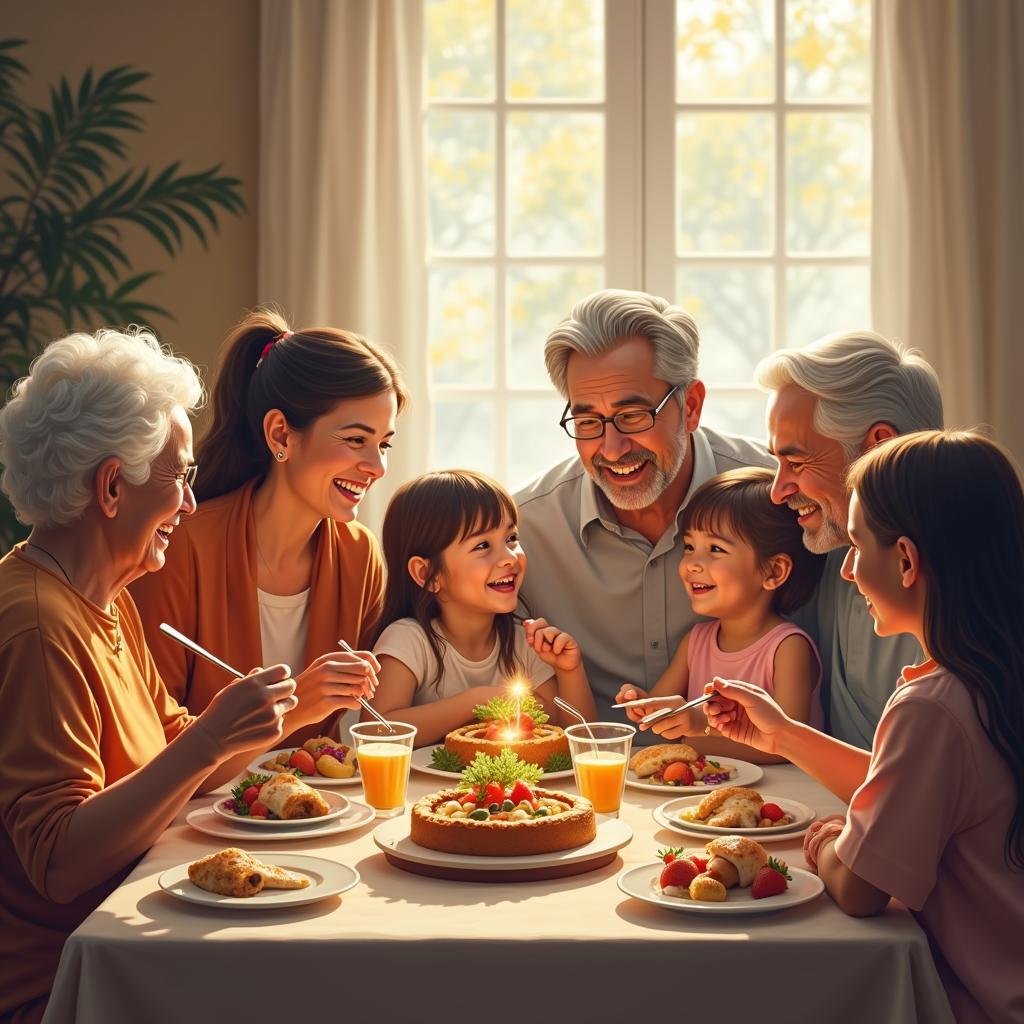
“Càng đông càng vui” – a phrase that encapsulates the Vietnamese spirit of togetherness and shared joy. But how do you express this sentiment in English? This article delves into the various ways to convey the meaning of “càng đông càng vui,” exploring nuanced expressions and cultural contexts.
 A lively party scene with people enjoying themselves, illustrating the concept of "the more the merrier"
A lively party scene with people enjoying themselves, illustrating the concept of "the more the merrier"
Finding the perfect English equivalent depends on the situation. Sometimes, the simple phrase “the more the merrier” fits perfectly. This idiom directly translates the idea of increased numbers leading to increased enjoyment. Imagine planning a picnic and someone asks if they can bring a friend. “The more the merrier!” is the perfect response. This idiom is especially useful in informal settings, expressing a welcoming and inclusive attitude. khu vui chơi cho trẻ ở hải phòng
Beyond “The More the Merrier”: Other Ways to Express “Càng Đông Càng Vui”
While “the more the merrier” is a common and convenient translation, English offers a wider range of expressions to capture the nuances of “càng đông càng vui.” Let’s explore some alternatives:
-
“The more, the better”: This phrase emphasizes the positive correlation between quantity and quality of enjoyment. It works well in situations where having more people contributes directly to a better outcome, like a brainstorming session or a potluck dinner.
-
“There’s always room for one more”: This expression conveys a welcoming and hospitable tone, implying that everyone is welcome to join, regardless of the existing crowd size.
-
“It’s more fun with a crowd”: This phrase directly states the benefit of having more people involved, highlighting the social and energetic aspect of group activities.
-
“Strength in numbers”: While not directly related to fun, this idiom emphasizes the advantages of a larger group, which can indirectly translate to more enjoyment, especially in activities requiring collaboration or support.
 A family gathering with multiple generations enjoying a meal together, emphasizing the joy of togetherness.
A family gathering with multiple generations enjoying a meal together, emphasizing the joy of togetherness.
“Càng Đông Càng Vui” in Different Contexts
The most suitable translation for “càng đông càng vui” also depends on the context. For example, if you are talking about a party, “the more the merrier” or “it’s more fun with a crowd” are excellent choices. lop hoc vui nhon 158 However, if you are referring to a community project, “strength in numbers” might be more appropriate.
How do I use “càng đông càng vui” in everyday conversations?
Using the English equivalent depends heavily on the situation. In casual settings, “the more the merrier” is perfectly acceptable. For more formal occasions, consider using phrases like “the more, the better” or tailor your response to the specific context.
What are some other related Vietnamese phrases?
Phrases like “vui như Tết” (happy as Tet) and “nhà có khách quý” (the house has honored guests) relate to the joy of togetherness and celebration, similar to the spirit of “càng đông càng vui.”
Conclusion: Embracing the Spirit of “Càng Đông Càng Vui”
Whether you choose “the more the merrier,” “the more, the better,” or a more nuanced expression, the essence of “càng đông càng vui” lies in the celebration of togetherness. ebook quang ganh lo di ma vui song By understanding the various ways to express this sentiment in English, you can effectively communicate the Vietnamese spirit of shared joy and inclusivity. ngày xuân vui cưới ca nhạc Embrace the spirit of togetherness and remember that sometimes, “càng đông càng vui,” the more the merrier! ban muon hen ho vui cuoi
FAQ
- What is the most common English translation for “càng đông càng vui”?
- Are there other ways to say “càng đông càng vui” besides “the more the merrier”?
- How do I choose the right English phrase for different situations?
- What are some related Vietnamese phrases that express similar sentiments?
- What is the cultural significance of “càng đông càng vui” in Vietnamese society?
- Can “càng đông càng vui” be used in formal settings?
- How can I learn more about Vietnamese culture and language?
Gợi ý các câu hỏi khác:
- Sự khác biệt về văn hóa khi sử dụng “càng đông càng vui” và “the more the merrier”?
- Có những tình huống nào mà “càng đông càng vui” không phù hợp?
Gợi ý bài viết khác có trong web:
- Học tiếng Anh giao tiếp
- Văn hóa Việt Nam
Khi cần hỗ trợ hãy liên hệ Số Điện Thoại: 02543731115, Email: gamevui@gmail.com Hoặc đến địa chỉ: G55W+PWG, 686 Đ. Võ Văn Kiệt, Long Tâm, Bà Rịa, Bà Rịa – Vũng Tàu 790000, Việt Nam. Chúng tôi có đội ngũ chăm sóc khách hàng 24/7.